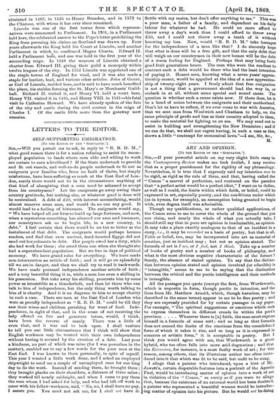LETTERS TO THE EDITOR.
SELF-SUPPORTING EMIGRATION.
[TO TEE EDITOR OF THE " SPECTATOR:]
you permit me to ask, in reply to "R. B. D. M.," what good reason there is for a nation refusing to assist its unemployed population to lands where men able and willing to work are certain to earn a livelihood ? If the State undertook to provide and fit out vessels, and well-to-do people undertook to fit out as emigrante poor families who, from no fault of theirs, but simply misfortune, have been suffering so much at the East End of London, surely there would not be in the circumstance anything of that kind of almsgiving that a man need be ashamed to accept from his countrymen? Let the emigrants go away owing their country gratitude, but nothing else, or whatever good is done will be neutralized. A debt of £20, with interest accumulating, would almost unnerve some men, and would do no one any good. It would lead to a feeling of bitterness. The emigrants would say, "We have helped all our lives to build up large fortunes, and now, when a mysterious something has silenced our axes and hammers, our countrymen ask us to begin life, in a new country, in debt." I feel certain that there would be no tax so bitter as the instalment of that debt. The emigrants would perhaps become readers, and find that even ancient, hard-hearted Egypt did not send out her,colonists in debt. Her people owed her a duty, while she had work for them ; she owed them one when she thought she had a superabundant population. But we live in days of political economy. We have grand rules for everything. We have made non-intervention an article of faith ; and it will go on splendidly till we are in danger, and then we shall try to read it backwards. We have made personal independence another article of faith ; and a very beautiful thing it is, while a man has even a shilling in his possession. But take away his shilling, prostrate him by some power as irresistible as a thunderbolt, and then let those who can talk to him of independence, but the only thing worth talking to him of is charity. And it is no disgrace to him to accept charity in such a case. There are men at the East End of London who were as proudly independent as "B. B. D. M." could be till they saw their wives and children perishing for want of food. Independence, in sight of that, and in the sense of not receiving the help offered on fair and generous terms, would, I think, have been the reverse of manly. There was a little of even that, and it was sad to look upon. I shall venture to tell you one little circumstance that I think will show that English workmen may be trusted with their own independence without having it secured by the creation of a debt. Last year a kindness, no part of which was mine (for I was powerless in the matter), enabled me to say a few words for the poor men at the East End. I was known to them personally, in spite of myself. This year I wanted a little work done, and I asked an employed shipwright to send me a couple of unemployed ones for one long day to do the work. Instead of sending them, he brought them ; they brought planks on their shoulders, a distance of three miles ; they worked till nearly midnight, and when I came to pay them the man whom I had asked for help, and who had left off work to come with his fellow-workmen, said, "No, no, I shall have no pay, I assure you. You need not ask me, for I shall not have it.
Settle with my metal, but don't offer anything to me." This was a poor man, a father of a family, and dependent on his daily labour for whatever he had. He could no more afford to throw away a day's work than I could afford to throw away 150, and I could not throw away a tenth of it without knowing my loss. Now, would "R. B. D. M." take hostages for the independence of a man like that? I do sincerely hope that what is done will be a free gift, and that the only debt that will weigh on our countrymen in their new homes will be the debt of a warm feeling for England. Perhaps that may bring forth good fruit generations hence. The men who were the readiest to contract such a debt would be those who had the least intention of paying it. Honest men, knowing what a seven years' apprenticeship meant, would be appalled at the idea of a new apprenticeship of twenty-eight years. I freely admit that free emigration is not a thing that a government should lead the way in, or embark in at all, without some special and sound canoe. The question is whether such a cause exists now. If there does, let it be a bond of union between the emigrants and their motherland. Don't let us have to reflect, if we ever come to war with America, that we sent men from Woolwich and Chatham to help, on the same principle of profit and loss as their country adopted to them, to make the material for fighting us on sea. We may send out to assist in building and strengthening the New Dominion ; and if we can do that, we shall not regret having, in such a case as this, shown a little "contempt for economical laws."—I am, Sir, &c.,
M.






























 Previous page
Previous page